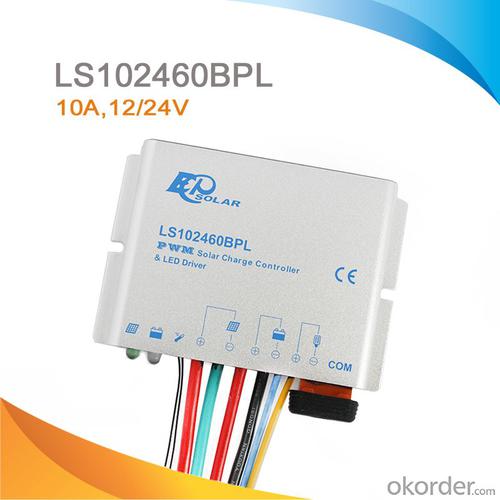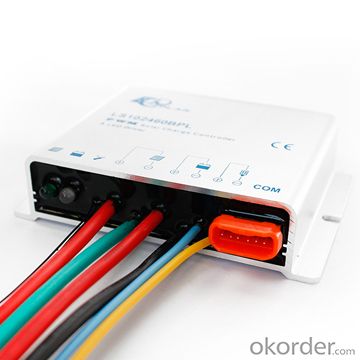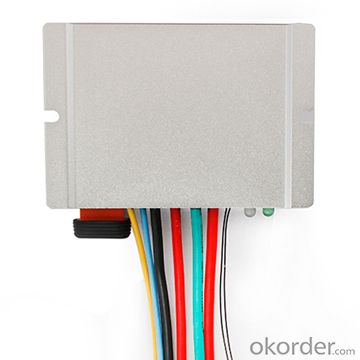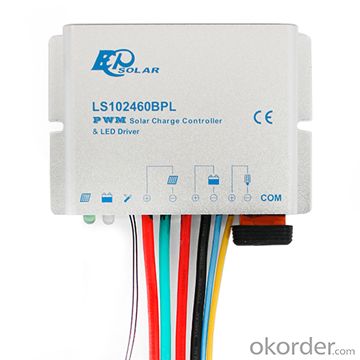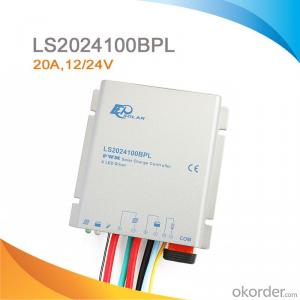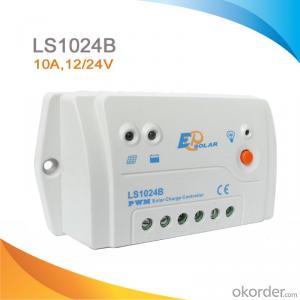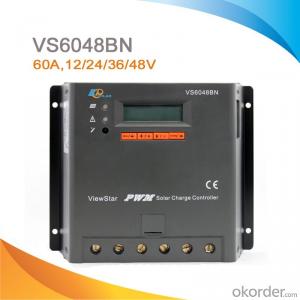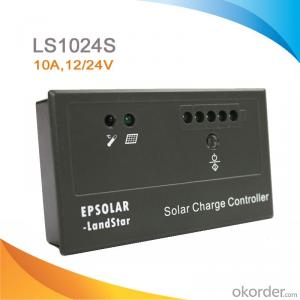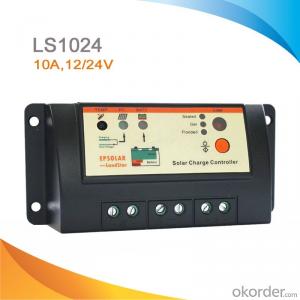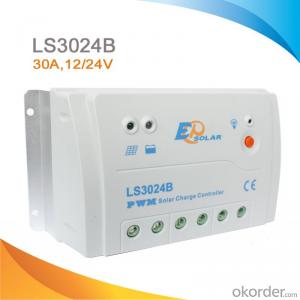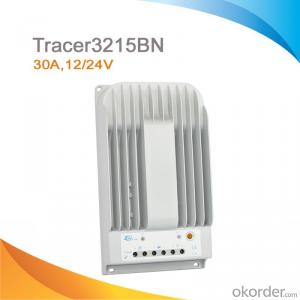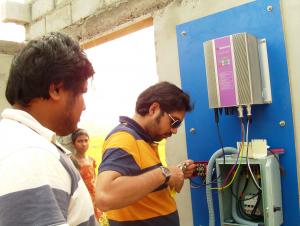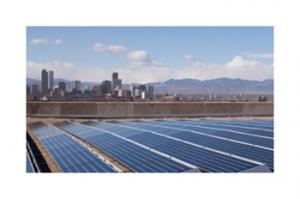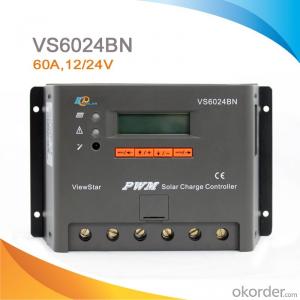Solar Charge Controllers Sudbury PWM Solar Charge Controller and LED Constant Current Driver 10A, 12/24V, LS102460BPL
OKorder Service Pledge
OKorder Financial Service
You Might Also Like
Descriptions:
A charge controller, or charge regulator is basically a voltage and/or current regulator to keep batteries from overcharging. It regulates the voltage and current coming from the solar panels going to the battery. Most "12 volt" panels put out about 16 to 20 volts, so if there is no regulation the batteries will be damaged from overcharging. Most batteries need around 14 to 14.5 volts to get fully charged.
LandStar BPL series solar charge controller combines the solar charge controller and LED constant current driver into one unit which is ideal for solar LED Lighting, especially for the application for LED lamp which requires dimmer function. It can also reduce the system cost and increase the system flexibility.
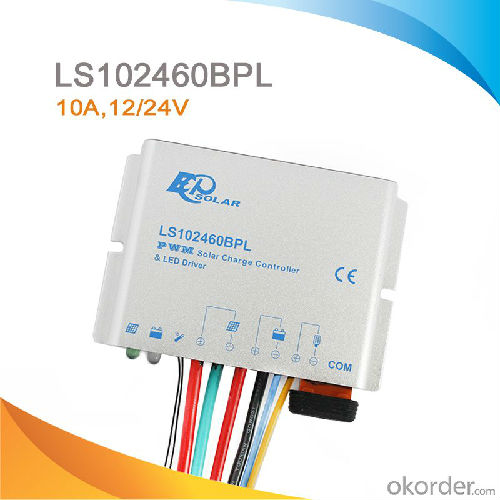
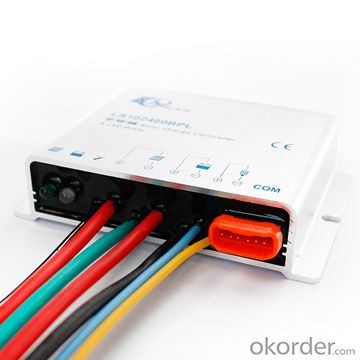
Features:
·12V/24V automatic identify or user-defined working voltage.
·Gel, Sealed, Flooded and user-defined battery type option.
·With functions of current power calculation, it is convenient to view charging and discharging energy of each day, month, year and total value.
·Wide input voltage range:DC8.0V—DC32V, compatible with 12V/24V full voltage range.
·Digital precision constant current control and the control accuracy are better than ± 2%.
·Maximum output efficiency of 95%.
·The rated output current can be adjusted at rated power and current range.
·The max output voltage can reach up to 60V
·Charge control parameter, the load control parameter and the output current value can
be set separately.
·Use of standard Modbus communication protocol for TTL232 bus connections,
communication protocol compatibility much better.
·Fully encapsulated PCB, IP67 protection.
·Aluminum housing.
Load control mode:
Manual, Light ON/OFF, Light ON+ Timer, Time Control
Electronic Protections:
·PV array short circuit
·PV reverse polarity
·High voltage transients
·Over discharge
·Overcharge
·Load overload
·Load short circuit
·Battery reverse polarity
·Overheating

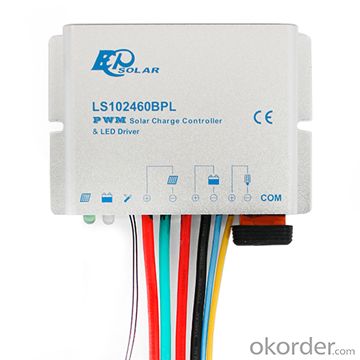
Specification:
Electrical parameters | LS102460BPL |
Nominal system voltage | 12 / 24VDC |
Battery terminal voltage | 8~32V |
Maximum PV input voltage | 50V |
Rated charge current | 10A |
Rated output power | 30W/12V, 60W/24V |
Rated output current | 2.0A |
Max. efficiency | 95% |
Output voltage range | Voltage of battery~60.0V |
Load open circle voltage | 60.0V |
Power output adjustment time | <10s |
Self-consumption | ≤9.1mA(12V); ≤7.0mA(24V) |
Control accuracy | < 2% |
Temp. compensation coefficient | -3mV/℃/2V(25℃) |
Enclosure | IP67 |
Dimension | 108.5x73x25.6 mm |
Power cable | 4mm2(PV/Batt.) 1.0mm2(Load) |
Net weight | 0.4kg |
Working temperature | -35℃ to +55℃ |
Humidity | ≤90%(NC) |
FAQ
The enclosure of charge controller:
If the controllers are used indoors or outdoors but with box, user can choose IP30 solar controller. For outdoor application, sometimes steam condenses to water when it touches a cold surface. And the water can come into controllers along with the wire. So it’s better to use high IP rating controller in humid area.
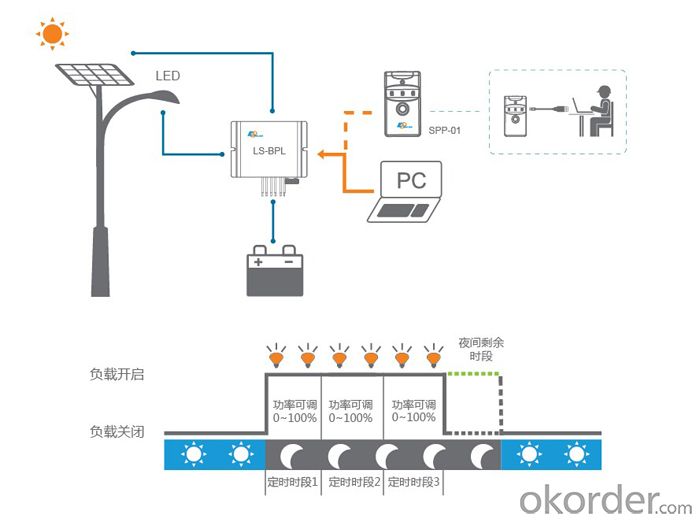
- Q: What is the role of a temperature sensor in a solar controller?
- The role of a temperature sensor in a solar controller is to measure the temperature of the solar panels or other components in the solar system. This information is then used by the controller to optimize the performance of the system, such as adjusting the tilt angle of the panels or regulating the flow of heat transfer fluid. The temperature sensor helps ensure that the solar system operates efficiently and effectively, maximizing the energy output and prolonging the lifespan of the components.
- Q: Can a solar controller increase the efficiency of a solar panel?
- Yes, a solar controller can increase the efficiency of a solar panel. A solar controller regulates the flow of energy from the solar panel to the battery or load, ensuring optimal charging and preventing overcharging or damage. This regulation helps maximize the conversion of solar energy into usable power, resulting in increased efficiency and improved performance of the solar panel system.
- Q: How do I choose the right solar controller for my solar system?
- Choosing the right solar controller for your solar system is an important decision that can significantly impact the efficiency and longevity of your system. Here are some steps to consider when selecting the appropriate solar controller: 1. Determine your system's voltage and current requirements: Start by understanding the voltage and current ratings of your solar panels and batteries. This information will help you choose a controller that can handle the specific requirements of your system. 2. Decide on the type of solar controller: There are generally two types of solar controllers - PWM (Pulse Width Modulation) and MPPT (Maximum Power Point Tracking). PWM controllers are simpler, more affordable, and suitable for smaller systems. MPPT controllers, on the other hand, are more advanced and efficient, making them ideal for larger systems or those with shaded or irregularly shaped panels. 3. Assess the maximum current and voltage rating: Ensure that the solar controller you choose can handle the maximum current and voltage produced by your solar panels. It is essential to select a controller that matches or exceeds the specifications of your system to avoid any potential damage or inefficiencies. 4. Consider additional features: Some solar controllers offer additional features such as temperature compensation, LCD displays, remote monitoring capabilities, and programmable settings. Evaluate these features based on your specific needs and preferences. 5. Read product reviews and recommendations: Look for customer reviews and recommendations from reputable sources or solar experts. This will help you gather insights and experiences from others who have used the particular solar controller you are considering. 6. Consult with a professional: If you are unsure or need expert advice, it is recommended to consult with a solar professional or installer. They can assess your system's requirements and provide guidance on selecting the right solar controller for your needs. Selecting the appropriate solar controller is crucial to ensure the optimal performance and longevity of your solar system. By considering factors such as voltage and current requirements, type of controller, maximum current and voltage rating, additional features, and seeking professional advice, you can make an informed decision and choose the right solar controller for your solar system.
- Q: Can a solar controller be used with a solar-powered greenhouse ventilation system?
- Yes, a solar controller can be used with a solar-powered greenhouse ventilation system. A solar controller regulates the amount of power flowing from the solar panels to the ventilation system, ensuring optimal performance and preventing overcharging. It helps to monitor and manage the energy generated by the solar panels, allowing for efficient and effective operation of the greenhouse ventilation system.
- Q: How do I prevent short-circuiting with a solar controller?
- To prevent short-circuiting with a solar controller, there are a few important steps you can take: 1. Proper wiring: Ensure that all wiring connections are securely tightened and properly insulated. Loose or exposed wires can increase the risk of short-circuiting. Use high-quality cables and connectors that are rated for the current and voltage of your solar system. 2. Fuse or breaker protection: Install appropriate fuses or circuit breakers in the positive and negative connections between the solar panels, controller, and battery bank. These protective devices will automatically disconnect the circuit in case of a short-circuit, preventing any damage to the controller or other components. 3. Regular maintenance: Inspect your solar system regularly for any signs of wear, damage, or loose connections. Clean the panels to ensure maximum efficiency and remove any debris that could potentially cause a short-circuit. 4. Proper grounding: Ensure that your solar system is properly grounded. This involves connecting the negative terminal of the battery bank to a grounding rod. Grounding helps to dissipate any stray electrical charges and reduces the risk of short-circuiting. 5. Use an appropriate solar controller: Make sure you select a solar controller that is suitable for your specific solar system configuration and its maximum current and voltage requirements. Oversized or undersized controllers can increase the risk of short-circuiting. 6. Follow manufacturer guidelines: Always consult the manufacturer's instructions and guidelines for your specific solar controller. They often provide specific recommendations and precautions to prevent short-circuiting and ensure the safe operation of your solar system. By following these preventive measures, you can greatly reduce the potential for short-circuiting in your solar controller and ensure the efficient and safe functioning of your solar power system.
- Q: How does a solar controller handle low voltage disconnect for battery protection?
- A solar controller handles low voltage disconnect for battery protection by continuously monitoring the voltage level of the battery. When the voltage drops below a predefined threshold, the solar controller disconnects the load from the battery to prevent over-discharge. This helps to safeguard the battery's health and prolong its lifespan.
- Q: How does a solar controller prevent damage from power fluctuations?
- A solar controller prevents damage from power fluctuations by regulating and stabilizing the flow of electricity from the solar panels to the battery or grid. It monitors the voltage and current levels and adjusts them accordingly, ensuring that the power supplied remains within safe limits. This prevents overcharging, overheating, and other potential damage that could occur due to unpredictable fluctuations in power output.
- Q: Solar controller one machine how
- First of all, if you are using a multifunctional VRV system, triple the (air conditioning, to warm, hot water) together, then connect the solar energy, solar energy is auxiliary equipment, can not be set as the main control equipment. Finally, I would like to ask, your one machine is a computer or I said one machine
- Q: What is the maximum number of load control timers supported by a solar controller?
- The maximum number of load control timers supported by a solar controller can vary depending on the specific model and brand. However, in general, solar controllers typically support a range of load control timers, with some models offering around 10 to 15 timers. It is important to refer to the product specifications or consult the manufacturer's documentation to determine the exact number of load control timers supported by a specific solar controller.
- Q: How do I protect a solar controller from insects or pests?
- To protect a solar controller from insects or pests, you can consider a few measures. Firstly, ensure that the controller is installed in a secure and enclosed location, such as a locked box or an insect-proof housing. This will prevent insects or small pests from coming into direct contact with the controller. Additionally, you can use insect repellents or pest control methods in the vicinity of the controller to deter any potential pests. Regular cleaning and maintenance of the controller, including removing any debris or insect nests, can also help prevent insect or pest infestation.
Send your message to us
Solar Charge Controllers Sudbury PWM Solar Charge Controller and LED Constant Current Driver 10A, 12/24V, LS102460BPL
OKorder Service Pledge
OKorder Financial Service
Similar products
Hot products
Hot Searches
Related keywords




